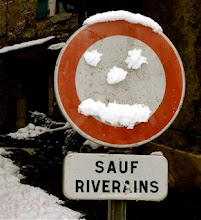
I picked up this film accidentally and almost put it back on the racks after I read that it was a musical. For all my love of Nouvelle Vague, the director Jacques Demy unfortunately did not ring a bell. Fortunately, I decided to borrow the movie from my local library and watched it.
The film started with a beautiful shot of the seaside town of Cherbourg (now known as Cherbourg-Octeville), colorful umbrellas accompanied by the pensive music of Michel Legrand. Premiére Partie: Le Départ begins with an explosion of happy music. It's November 1957 and we are introduced to 20-year-old Guy Foucher while he's working… and singing. He's a mechanic and he's not whistling a tune or singing some popular song while he's checking engines. The dialogue of the whole film is sung. Everybody is singing!
Hmmm… I'm curious and admittedly a little skeptical about the constant singing. The work day has ended. Guy and the other mechanics are washing up and talking, I mean singing- about their plans for the evening. It seems a little silly but actually they do pull it off because the acting and singing isn't overdone. A few minutes later, Guy is outside an umbrella shop where 17-year-old Geneviève Emery, played by Catherine Deneuve, runs out to throw her arms around him and sing sweetly "Mon amour, oh mon amour…". It takes less than six minutes into the movie and I'm hooked.
This movie has a lot of what I have come to love about French Cinema: lush and elegant cinematography, inventiveness, joie de vivre, elegant and stylish costumes, and interesting twists in the plot.
This film looks and sounds like a fairytale but it's a real story dealing with the difficult issues of love and overcoming difficulties. The music and the singing pulls at my heartstrings, underscoring the tenderness of the scenes of joys as well as profound disappointment and longing in the sad scenes. This film deepens my appreciation and knowledge of Nouvelle Vague as well as cute umbrellas. For language learners- the singing is an added bonus because the sung dialogue is more enunciated and slower.
You can watch the entire film in French with English subtitles here:
www.youtube.com/watch?v=l25gYXilNzk
(via/Thanks: www.openculture.com)
You can get your very own made to measure umbrella from Parisian designer Michel Heurtault: www.parasolerieheurtault.com
(via/Thanks: www.parisbao.com)

La photo: Un Parapluie à Jakarta, Indonesie. Septembre 2006.
Movie Poster from amazon.com, where the movie is available














